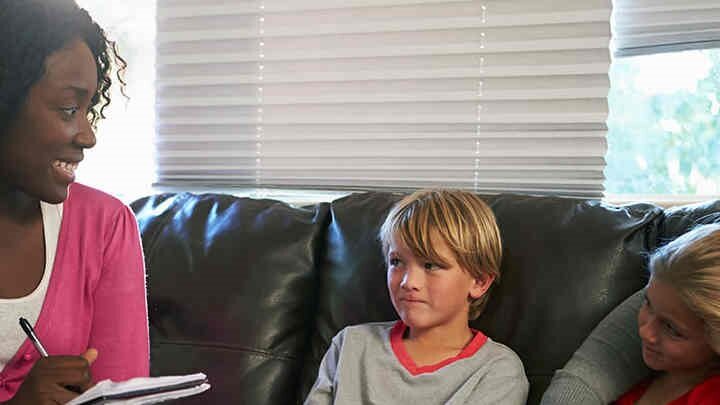A supportive experience on the MA in Social Work.
The MA in Social Work is a full-time course lasting for up to 24 months, depending on when you complete your dissertation.
As a student, you'll be encouraged to take part in interactive teaching sessions, including lectures, seminars and workshops. These sessions will enable you to develop a critical understanding and analysis of social work theory in practice.
You'll benefit from small classes, allowing for a more intimate and in-depth learning experience. You will develop practical skills and experience through placements later in the course.
We're committed to working in partnership with our students. Building positive professional relationships is key to social work education.
How?
In-person teaching with some online learning.

When?
Most teaching is in Semester 1 (September-January).

How often?
You'll be on campus for two or three days a week.

How teaching works
When and how you'll learn.
Teaching takes place face-to-face in Year 1. Students come onto campus on some Mondays, and every Tuesday and Wednesday in the lead up to the Christmas break.
Face-to-face teaching in Year 1 is also supplemented by high-quality asynchronous learning prepared by members of staff as tailored learning resources for you.
After the Christmas break, you will continue with Skills Days, and these will take place on two or three days each week throughout January before you start your first 70-day placement.
Typical Year 1 timetable
| Time | Monday | Tuesday | Wednesday |
|---|---|---|---|
| 9:30am - 11:00am | Lecture | Lecture | |
| 11:30am - 12:30pm | Seminar | Seminar | |
| 12:30pm - 1:30pm | *Skill Days | Lunch break | Lunch break |
| 1:30pm - 3:00pm | Lecture | Lecture | |
| 3:30pm - 4:30pm | Seminar | Seminar |
* Students will be expected to be on campus for Skills Days on specific dates between October and December and in January. These dates will be communicated directly to you.
Placements on the course.
You'll learn practical skills through two placements: one lasting for 70 days, and the other lasting 100 days.

Research-informed teaching.
You'll learn from active researchers and engage with current research throughout the course.

Your dissertation
A crucial part of your MA.
As a master's student, you will produce an extended and independent piece of work: a dissertation.
This allows you to demonstrate both professional and academic expertise on a social work topic of your choosing. Areas that our students have previously chosen to write about include:
- race, ethnicity and mental health;
- aspects of social work training regarding child sexual exploitation;
- portrayals of social work in media;
- approaches to social work and trauma;
- lesbian, gay, bisexual and trans issues in social work education.
You'll be supported through group workshops and one-to-one supervision from an academic expert who will help you in planning, carrying out and writing up your project.
Choose your dissertation approach
You will also have the choice to carry out a dissertation based upon one of four different approaches. This choice allows you to play to your individual strengths and/or interests.
Literature review
A review of the existing research literature.

Data analysis
Analysis of existing research data on your subject.

Discourse analysis
A discourse analysis of a chosen written and/or visual text.

Create training resources
Producing a training resource for social workers on your area of interest.

Teaching staff
Who you'll learn from.
The course is delivered by staff whose practice and academic expertise ensures up-to-date delivery of learning in social work education and practice.
You are likely to be taught by the following staff members on the course.
Alys has extensive experience in specialist social research involving Deaf people and sign language(s).
Many of her projects interface directly with statutory and non-statutory social work, social care and health provision.
Patricia's research focuses on exploring pedagogies for professional practice.
Much of her work focuses on exploring the impact of the interlocking social, political, emotional and cognitive context of educational environments for social workers.
Stephen's research encompasses LGBTQ issues in social work theory and practice, with a particular focus on foster care and adoption, questions of community and belonging and creative research methods.
Dharman's research examines conceptualisations of race and sexuality in social work, and the ways digital technologies and hybrid working approaches are influencing children and family’s social workers' practice.
Gary has extensive experience in social work practice, especially in the family justice system.
His interests and publications are in socio-legal areas of practice relating to contemporary issues in child protection.
Simon's area of specialist interest is dementia. He has worked as a social worker and in the not-for-profit sector in this area.
His research interests include acute hospital care for people living with dementia, dementia education and training for health and social care staff, and assistive technologies to support independence and autonomy.
Claire leads on the Assessed Readiness Direct Practice Module and the skills workshops on the MA in Social Work. She collaborates with people with lived experience, registered social work practitioners, and practice educators to involve them in student preparation for practice and assessment of students' readiness for practice.
Claire works in partnership with the Greater Manchester Social Work Academy (GMSWA) and local authority workforce development teams, social workers and practice educators, as well as other organisations, on placement learning opportunities.
Barbara leads in practice learning and has a work background in mental health social work.
Anna is the programme director for Applied Mental Health. This is the aspect of the social work department that is responsible for post-qualified mental health education.
Anna's interests are on complex and critical decision making in mental health, as well as teaching newly qualified mental health social workers in their assessed and supported year in employment.
Mark is passionate about the teaching the application of mental health law to health and social care professionals. He is the unit lead for the Best Interests Assessor (BIA) and Applied Law Units and Lead for statutory refresher training for AMHPs and DOLS professionals.
He was a member of the committee that developed the NICE guidelines 'Social work with adults experiencing complex needs' (2022). He also provides a wide range of external consultancy for local authorities and health trusts on the application of mental health law and 'legal literacy'.
Andrew teaches the application of mental health law and adult safeguarding.
Learn from service users
Benefit from a range of perspectives.
People with lived experience, practitioners and carers are involved as stakeholders in shaping the course to help you benefit from their experience.
They are very involved in the skills days during the first year of the programme, but are also involved in teaching students across the curriculum.
This includes a range of professionals who are involved in teaching such as qualified social workers, members of the judiciary, recruitment consultants, health professionals and police officers.
